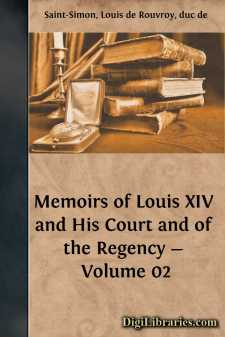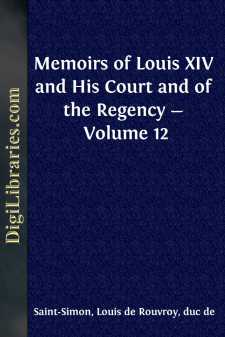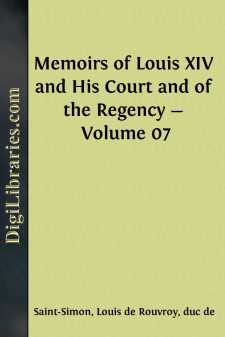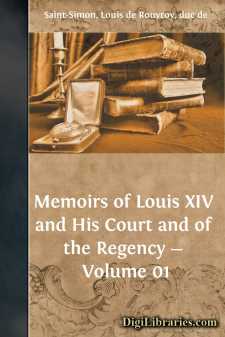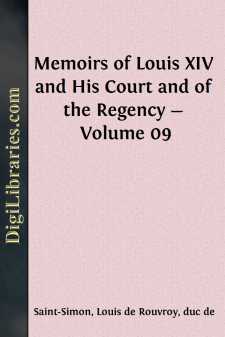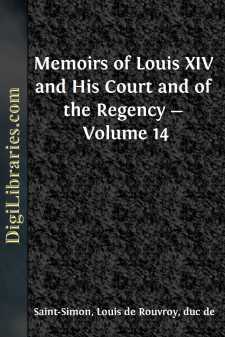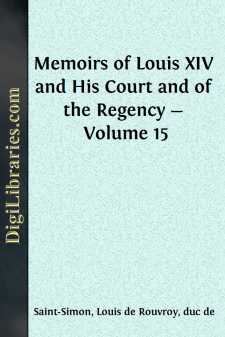Categories
- Antiques & Collectibles 13
- Architecture 36
- Art 48
- Bibles 22
- Biography & Autobiography 815
- Body, Mind & Spirit 144
- Business & Economics 28
- Children's Books 18
- Children's Fiction 14
- Computers 4
- Cooking 94
- Crafts & Hobbies 4
- Drama 346
- Education 58
- Family & Relationships 59
- Fiction 11835
- Games 19
- Gardening 17
- Health & Fitness 34
- History 1378
- House & Home 1
- Humor 147
- Juvenile Fiction 1873
- Juvenile Nonfiction 202
- Language Arts & Disciplines 89
- Law 16
- Literary Collections 686
- Literary Criticism 179
- Mathematics 13
- Medical 41
- Music 40
- Nature 180
- Non-Classifiable 1768
- Performing Arts 7
- Periodicals 1453
- Philosophy 65
- Photography 2
- Poetry 896
- Political Science 203
- Psychology 44
- Reference 154
- Religion 515
- Science 126
- Self-Help 85
- Social Science 83
- Sports & Recreation 34
- Study Aids 3
- Technology & Engineering 59
- Transportation 23
- Travel 463
- True Crime 29
Louis de Rouvroy Saint-Simon
Louis de Rouvroy, Duke of Saint-Simon (1675-1755), was a French soldier, diplomat, and writer, renowned for his extensive memoirs chronicling the reign of King Louis XIV and the early years of the Regency. His memoirs, spanning 1691 to 1723, provide a detailed and often critical view of the French court, offering invaluable insights into the politics, personalities, and social dynamics of the time. Saint-Simon's writings are celebrated for their vivid character sketches and their importance as historical documents, reflecting his unique perspective as a member of the aristocracy and an observer of royal affairs.
Author's Books:
Sort by:
To return now to the date from which I started. On the 6th of August, 1695, Harlay, Arch-bishop of Paris, died of epilepsy at Conflans. He was a prelate of profound knowledge and ability, very amiable, and of most gallant manners. For some time past he had lost favour with the King and with Madame de Maintenon, for opposing the declaration of her marriage— of which marriage he had been one of the...
more...
The Abbe Alberoni, having risen by the means I have described, and acquired power by following in the track of the Princesse des Ursins, governed Spain like a master. He had the most ambitious projects. One of his ideas was to drive all strangers, especially the French, out of the West Indies; and he hoped to make use of the Dutch to attain this end. But Holland was too much in the dependence of...
more...
INTRODUCTION No library of Court documents could pretend to be representative which ignored the famous "Memoirs" of the Duc de Saint-Simon. They stand, by universal consent, at the head of French historical papers, and are the one great source from which all historians derive their insight into the closing years of the reign of the "Grand Monarch," Louis XIV: whom the author shows to be...
more...
The death of D'Avaux, who had formerly been our ambassador in Holland, occurred in the early part of this year (1709). D'Avaux was one of the first to hear of the project of William of Orange upon England, when that project was still only in embryo, and kept profoundly secret. He apprised the King (Louis XIV.) of it, but was laughed at. Barillon, then our ambassador in England, was listened...
more...
INTRODUCTION No library of Court documents could pretend to be representative which ignored the famous "Memoirs" of the Duc de Saint-Simon. They stand, by universal consent, at the head of French historical papers, and are the one great source from which all historians derive their insight into the closing years of the reign of the "Grand Monarch," Louis XIV: whom the author shows to be...
more...
Let me here relate an incident which should have found a place earlier, but which has been omitted in order that what has gone before might be uninterrupted. On the 16th of the previous July the King made a journey to Fontainebleau, where he remained until the 14th of September. I should suppress the bagatelle which happened on the occasion of this journey, if it did not serve more and more to...
more...
For a long time a species of war had been declared between the King of England and his son, the Prince of Wales, which had caused much scandal; and which had enlisted the Court on one side, and made much stir in the Parliament. George had more than once broken out with indecency against his son; he had long since driven him from the palace, and would not see him. He had so cut down his income that he...
more...
Canaples, brother of the Marechal de Crequi, wished to marry Mademoiselle de Vivonne who was no longer young, but was distinguished by talent, virtue and high birth; she had not a penny. The Cardinal de Coislin, thinking Canaples too old to marry, told him so. Canaples said he wanted to have children. "Children!" exclaimed the Cardinal. "But she is so virtuous!" Everybody burst out...
more...
Few events of importance had taken place during my absence in Spain. Shortly after my return, however, a circumstance occurred which may fairly claim description from me. Let me, therefore, at once relate it. Cardinal Dubois, every day more and more firmly established in the favour of M. le Duc d'Orleans, pined for nothing less than to be declared prime minister. He was already virtually in that...
more...
Although, as we have just seen, matters were beginning to brighten a little in Spain, they remained as dull and overcast as ever in France. The impossibility of obtaining peace, and the exhaustion of the realm, threw, the King into the most cruel anguish, and Desmarets into the saddest embarrassment. The paper of all kinds with which trade was inundated, and which had all more or less lost credit, made...
more...


